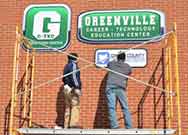 |
Greenville CBI and
Playing the Game of Life
By David Sykes
CBI Coordinator Greenville High School
Students of the Greenville CBI class played the game of Life for two
weeks in December. Not the classic board game but a dice-based
simulation that mimics random events in a person’s life.
Students begin by rolling dice to be assigned careers. By allowing
chance to decide their careers, students are forced to make choices and
manage resources based on chance. This adds a level of unpredictability
that forces students to make some tough decisions.
“The game was actually fun,” said Chase Quinn, sophomore at Greenville
High School. “The random variety of the game allowed for anything to
happen.”
Each day, students are awarded their monthly paycheck. This is based on
their career’s yearly salary, if they are an exempt employee, or their
hourly rate times 40 hours, if they are a non-exempt employee. This is
the money the students use to buy possessions that will allow them to
live within this fictional laboratory environment.
After a student’s career was decided, students continued to roll dice
and, based upon what number came up on the die, learn other elements of
their lives such as marital status, number of children, number of
credit cards and other loans, as well as other factors that determine a
person’s available resources.
“I thought it could use more details because some of the outcomes
weren’t very specific but I liked it because they were kind of funny,”
mentioned Jesse Green, sophomore.
Each school day the game is played represents one month in fictional
game time. Students earn salaries and must pay monthly bills and
expenditures when they receive their salaries. Another element that
adds a sense of realism is the inclusion of random “misfortunes” that
can happen to the student. At the end of each daily round, students
must roll to see if they have had a misfortune happen to them. These
can be as small as a minor parking ticket to as massive as having to
replace your house.
In addition to the misfortunes, to help students who were not fortunate
enough to get the “high paying” jobs, inclusion of social programs such
as public assistance and unemployment were added. The student who won
the game is the one who managed their resources the best.
“I liked playing the game.” said Tristan Hunt, sophomore. “I liked the
different things that happened in the game because of how you rolled
the dice.”
|
|
|
|

